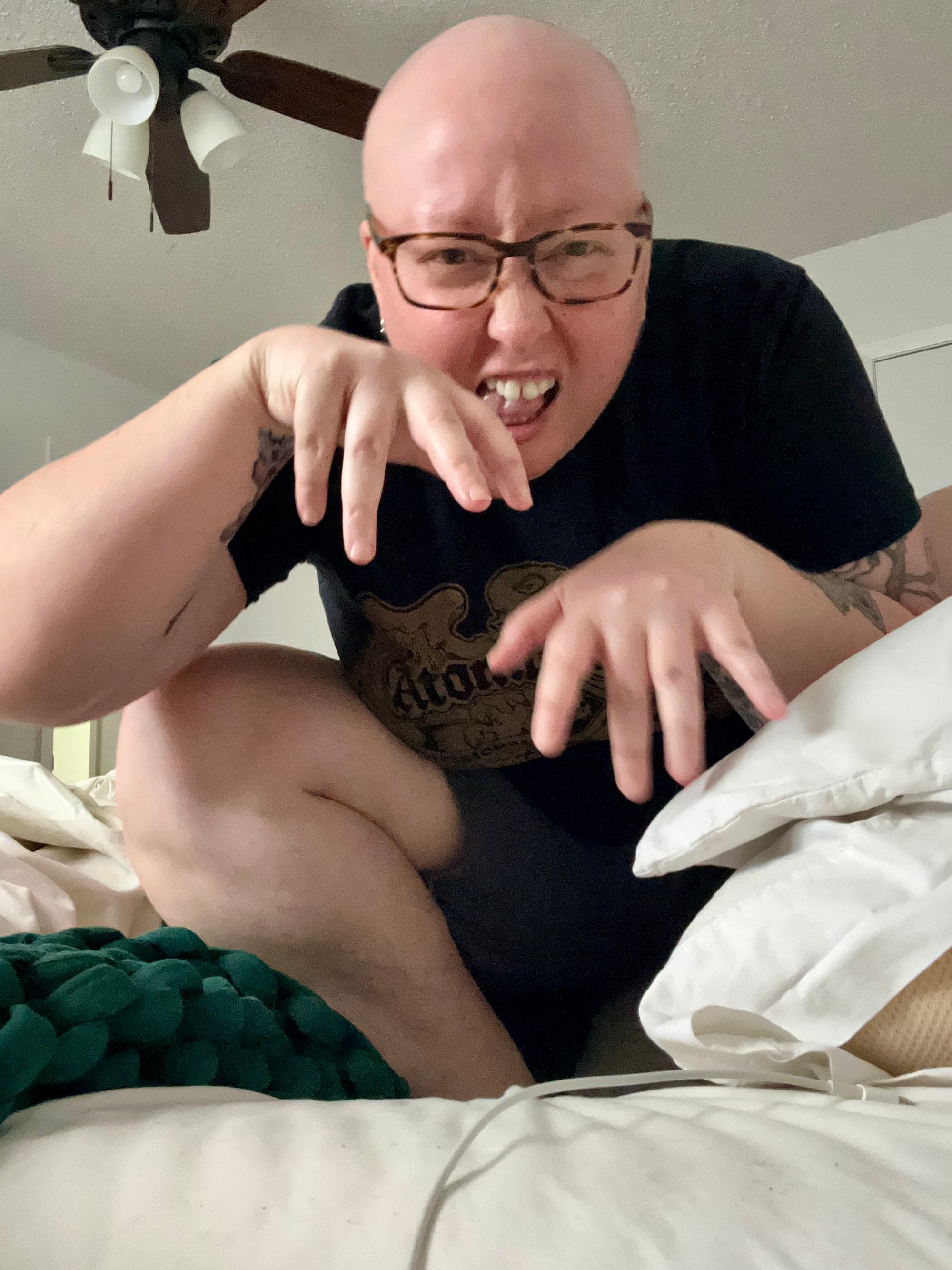Cancerversary!

Hi everyone! It’s been a minute since I’ve sent a newsletter. I’m hoping to have some good writing news I can share with you soon, but today I want to mark a different sort of milestone.
November 22 marks one year since I completed active cancer treatment! For those who don’t already know, I was diagnosed with stage 3c breast cancer in March 2024. I went through five months of chemotherapy, a double mastectomy, and six weeks of radiation. My case is a bit unusual among breast cancer survivors in that (1) I’m under 45 years old (only about 10% of breast cancer cases occur in people under 45) and (2) I’m trans.
Because of all this, when people learn I’m a writer, they assume I’m writing a book about the whole weird trip. But the truth is, I’ve struggled to write much of anything at all about it.

People expect a story of triumph or transformation, but the truth is: cancer is boring. Mostly, I hung out in bed watching old movies and Star Trek, eating ice cream, smoking weed, and otherwise existing in pure goblin mode. It was a lot of feeling tired and waiting for medical science to work its magic.
Of course, a lot of what made the experience so boring was luck and privilege. The people around me really stepped up to help when I needed help and gave me space when I needed space. I ended up with a great medical team and the resources to continue to access that great care with little administrative headache. I have a work-from-home day job that I could do from my bed with great benefits and understanding coworkers.
This is why I’ve grown to dislike the idea that cancer survivors are “heroes.” We shouldn’t have to be heroes. Many, and probably most, cancer survivors have to take heroic levels of action to continue to have access to the care and resources they need and to otherwise keep their lives afloat. That isn’t a cause for celebration. That is a sign that we, as a society, are doing something wrong. Healing should not be a matter of individual heroism. It should be a matter of collective care.
Obviously, this is far from unique to cancer. This is just another manifestation of the ableism that continues to plague our society. One would think that the universal experience of the fallibility and inevitable decline of the human body would make ableism rare, but the opposite is true. Almost every time I told someone I had cancer, I could tell they were trying to figure out what I did “wrong” so they could assure themselves it wouldn’t happen to them.
Many people try to convince themselves that good health is entirely a reflection of virtue and good behavior (or in some cases, the opposite — I also got a fair amount of people telling me that it’s only the “good ones” who get sick when they’re young. Cue Billy Joel!) and deny the huge element of chance. So, in this misguided quest for control over a scary reality, people deny the fact that ableism will inevitably harm them, too, and deny themselves the benefits of a society that recognizes this truth and acts accordingly.
Another weird part of my breast cancer journey was the role gender played in it. It’s a bit of a mindfuck to have dealt with gender dysphoria around my breasts my whole life, do my best to “make peace” with them as a transphobic society demanded, only to end up with a cancer that fed on estrogen and progesterone and forced me to have my breasts removed anyway. Maybe if I hadn’t felt compelled to “make peace” I would still have the 16 lymph nodes they had to remove and I wouldn’t be dealing with lymphedema (chronic swelling of my arm and hand as a result of lymph node removal) for the rest of my life!
Regardless, I experienced the situation as a rare trans win. During those 5 months of chemo, I had something to look forward to. I was finally able to acknowledge that top surgery was something I truly wanted and could thrive on the joy that at the end of chemo, I would be getting that thing I realized I wanted so badly.
For cisgender women, the experience is quite different. Instead of getting relief from gender dysphoria as I did, cisgender women with breast cancer often find themselves experiencing intense gender dysphoria for the first time on top of an already stressful situation. On top of that, most of these women have no idea that gender dysphoria is what they’re experiencing, because transphobia keeps this wisdom from them, which makes it even harder to deal with. I hope that once we get past what I hope is the last death rattle of ubiquitous transphobia, we all will benefit.
In short, most of what I’ve taken away from my cancer journey is a renewed commitment to and confidence in my principles. More than ever, I am clearer in my knowledge of who I am, who I want to be, and what kind of society I want to help create. I feel like the phoenix born of a dumpster fire. I am the same, but I am reborn.